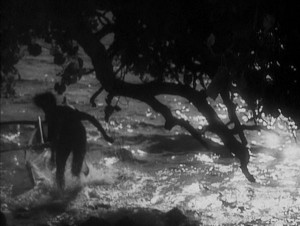From the August 2, 1991 Chicago Reader. — J.R.
The last film of F.W. Murnau, who was probably the greatest of all silent directors (he didn’t live long enough to make sound films, as he died in an auto accident only a few days after work on the musical score of this masterpiece was completed). Filmed entirely in the South Seas with a nonprofessional cast and gorgeous cinematography by Floyd Crosby (fully evident in this fine restoration), this began as a collaboration with the great documentarist Robert Flaherty, who still shares credit for the story, though clearly the German romanticism of Murnau (Nosferatu, The Last Laugh, Sunrise) predominates, above all in the heroic poses of the islanders and the fateful diagonals in the compositions. The simple plot is an erotic love story complicated by the fact that the young woman becomes sexually taboo when she is selected by an elder (one of Murnau’s most chilling harbingers of doom) to replace a sacred maiden who has just died. The two “chapters” of the film are titled “Paradise” and “Paradise Lost,” and another theme is the corrupting power of “civilization” — money in particular — on the innocent hedonism of the islanders. (Murnau himself was in flight from the Hollywood studios when he made the picture, although Paramount wound up releasing it.) However dated some of this film’s ethnographic idealism may seem today, the breathtaking beauty and artistry make it indispensable viewing, and the exquisite tragic ending — conceived musically and rhythmically as a gradually decelerating diminuendo — is one of the pinnacles of silent cinema (1930). (Music Box, Sunday through Thursday, August 4 through 8)




